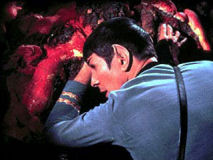When I was a boy, I loved Star Trek. For nearly twenty years, Portland’s KPTV (channel 12) broadcast the series at 4pm every Sunday afternoon. We didn’t have a television for much of my childhood, but most of my friends did. Whenever possible, I would watch Star Trek.
When the series was released on DVD a few years ago, I bought the first season, but I never watched it. It’s been gathering dust.
A few weeks ago, I decided to make some clam chowder. This is a laborious process. Though I enjoy it, the work takes a couple hours, and much of it is mindless. “I should watch something on the computer,” I thought. “I should watch Star Trek.” And so I did. I’ve been watching one episode a night ever since.
Many of the early episodes are truly awful — there are good reasons the show struggled to stay on the air. But by the middle of the first season, things began to click. The writers and producers discovered their characters and figured out how to tell their stories.
I plan to do a full review of season in about a week, but I want to take the time to mention one of my favorite episodes: The Devil in the Dark. On an important mining colony, a mysterious creature is terrorizing the workers. This mysterious beast can move through solid rock, and it dissolves anyone it touches. Fifty men have died in just a few months. The Enterprise is summoned to eliminate the problem.
 Initially, Kirk and company intend to destroy the creature. But, as he is wont to do, Spock begins to suspect that there’s something deeper to the problem. He’s right, of course. First of all, the life form is silicon-based, something that is seemingly impossible. Second, it is highly intelligent. And finally, it is merely defending its nest, which has been disrupted by the mining activities.
Initially, Kirk and company intend to destroy the creature. But, as he is wont to do, Spock begins to suspect that there’s something deeper to the problem. He’s right, of course. First of all, the life form is silicon-based, something that is seemingly impossible. Second, it is highly intelligent. And finally, it is merely defending its nest, which has been disrupted by the mining activities.
Watching the episode tonight, it was shockingly obvious that this is where my appreciation of inter-species friendship and communication originated. It was from watching this episode of Star Trek when I was a boy that I developed an appreciation for other animals, and began to suspect that other species might harbor intelligence that we, as humans, could barely comprehend. From there, it was only a small jump to similar philosophical positions.
Many of these Star Trek episodes don’t stand up well upon re-viewing. I haven’t seen them in twenty (or thirty!) years, and what I loved as a boy is sometimes almost unwatchable as an adult. (The Corbomite Maneuver is mind-numbingly bad.) But The Devil in the Dark is as good as I remembered. Amazing that much of the framework of the adult J.D.’s belief system can be traced to one hour of television made in 1965…

Best….episode….ever! “I’m a doctor not a bricklayer!”, “Pain!”, ah such a classic. You’re post brings up the genius of Gene Roddenberry’s vision, his optimistic view of the future with its technology and moralities, have served to inspire many kids of the ’70s. I know it had an impact on my way of thinking and looking at the world. By the way, what do you think of the new ‘enhanced effects’ Star Treks that Paramount has been airing on television as of late? I think they look pretty good! The new effects are rather subtle and don’t seem to detract from the story at all and (imho) are a welcome update of a classic series. Also, you didn’t like “The Corbomite Maneuver”? Its what I consider a ‘fun’ episode. the goofy ending with the tranya drinking midget? Classic!
I can’t believe how expensive the series was when it first came out (I paid $128 PER SEASON). I can’t even look at the price tag today; I’d probably cry.
If you’re looking to review the next two seasons, but aren’t ready to run out and buy, let me know, JD. I’d be happy to loan them to you…me & my SO could meet you & your wife up at the Bomber or something.
But by the middle of the first season, things began to click. The writers and producers discovered their characters and figured out how to tell their stories.
It’s probably no coincidence that the middle of the first season was when Gene Roddenberry got kicked out of the line producer’s chair and up to being the “executive producer”, being replaced by Gene Coon, who remained the producer through the end of the second season.
While no one can take away from Roddenberry his creation of the show and the fact that he managed to get it on the air (no mean feat, then or now), I credit Coon with making Star Trek a great TV series. Roddenberry put the framework in place, but Coon made it work. By contrast, the framework for Roddenberry’s later series (including The Next Generation) never really got a producer who could make them work.
Unfortunately, Gene Coon died before the Star Trek phenomenon began, and so perhaps the most important influence on the artistic success of the franchise never had the opportunity to provide his own perspective on what made the series work (conflict! adventure! characterization which promoted conflict and adventure!). Instead we mostly hear the “one big happy future” claptrap that I think had almost nothing to do with what made the series fun to watch.
“No Kill I”
-Words to live by!
Is this the Horta? Mother loved Star Trek. Especially the Yangs and the Cooms episode.